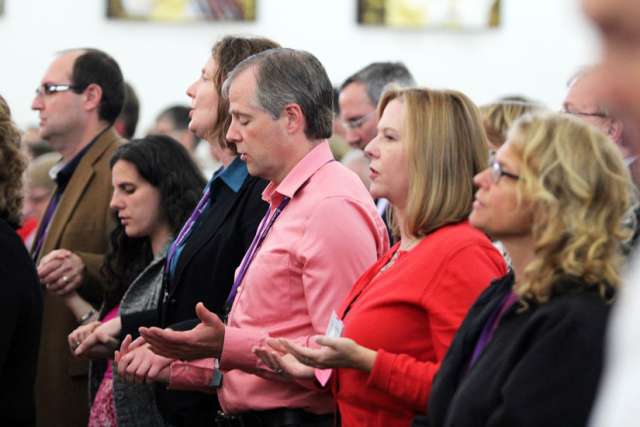Fr. Scott Lewis is an associate professor of New Testament at Regis College, a founding member of the Toronto School of Theology.
He is a past president of the Canadian Catholic Biblical Association.
33rd Sunday in Ordinary Time (Year A) Nov. 16 (Proverbs 31:10-13, 16-18, 20, 26, 28-31; Psalm 128; 1 Thessalonians 5:1-6; Matthew 25:14-30)
The job description of a good wife in the Book of Proverbs is daunting. The described individual is a combination of social worker, business woman, mother and companion. One can only hope that equal standards apply to the husband in question.
God’s Spirit dwells in us
By Fr. Scott Lewis, S.JDedication of the Lateran Basilica (Year A) Nov. 9 (Ezekiel 47:1-2, 8-9, 12; Psalm 46; 1 Corinthians 3:9b-11, 16-17; John 2:13-22)
In ancient Israel the temple was a rich metaphor for the life-giving presence of God. For people of the ancient world, temples were theology books in stone. Their mathematical proportions and symbolic structures were meant to reflect divine and cosmological principles. The temple was often referred to as the navel or axis of the world.
Reach for the helping hand of hope
By Fr. Scott Lewis, S.JAll Souls’ Day (Year A) Nov. 2 (Lamentations 3:17-26; Psalm 103; 1 Corinthians 15:51-57; Matthew 11:25-30)
How do we go on when our whole world has collapsed?
‘The Gospel without joy is not the Gospel’
By Fr. Scott Lewis, S.J30th Sunday in Ordinary Time (Year A) Oct. 26 (Exodus 22:21-27; Psalm 18; 1 Thessalonians 1:5c-10; Matthew 22:34-40)
Remember who you were and what it felt like to be abused and oppressed. Exodus addressed this admonition and guidance to the Israelites but it is also meant for us. The people of Israel were reminded to remember the bitterness and suffering of slavery in Egypt in all of their dealings with other people. It is a variation on the Golden Rule — if you didn’t like the way you were treated, then don’t treat others in the same manner.
Give to God that which is His
By Fr. Scott Lewis, S.J29th Sunday in Ordinary Time (Year A) Oct. 19 (Isaiah 45:1, 4-6; Psalm 96; 1 Thessalonians 1:1-5ab; Matthew 22:15-21)
Who are the “good guys” and “bad guys” in our world? We are prone to dividing the world into the sheep and the goats and attaching the appropriate tags. It can be rather satisfying, and it doesn’t take much reflection or discernment. A mere negative visceral reaction to someone is usually sufficient grounds for a damning label.
Seeking communion with God in the Bible
By Fr. Scott Lewis, S.J28th Sunday in Ordinary Time (Year A) Oct. 12 (Isaiah 25:6-10a; Psalm 23; Philippians 4:12-14, 19-20; Matthew 22:1-14)
Modern people climb great mountains simply because they are there and they want to prove themselves. In the ancient world, mountains were frightening and awesome places where human beings encountered God. Isaiah painted a prophetic picture of the encounter for which so many people had yearned.
The right path is the just path
By Fr. Scott Lewis, S.J27th Sunday in Ordinary Time (Year A) Oct. 5 (Isaiah 5:1-7; Psalm 80; Philippians 4:6-9; Matthew 21:33-43)
The prophets of Israel had an array of instruments at their disposal in their struggle to reform the nation. Symbolic behaviour — a form of street theatre — was one such technique, and it was very effective in the hands of someone like Jeremiah.
Receive the Gospel joyfully
By Fr. Scott Lewis, S.J26th Sunday in Ordinary Time (Year A) Sept. 28 (Ezekiel 18:25-28; Psalm 25; Philippians 2:1-11; Matthew 21:28-32)
No one is responsible for anything — we are all victims. If that sounds strange, that’s because it is — and yet it is one of the attitudes present in our culture. If we get in a scrape, the blame lies elsewhere — society, upbringing, personality disorders and genetics — but not with us. Even God is sometimes blamed, or accused of being unfair. God’s job is to give us a smooth, easy, and happy life and to respond to our demands.
God does not play by human rules
By Fr. Scott Lewis, S.J25th Sunday in Ordinary Time (Year A) Sept. 21 (Isaiah 55:6-9; Psalm 145; Philippians 1:20-24, 27; Matthew 20:1-16)
It is often said that God is merely a projection of human wishes and fears. An ancient Greek philosopher once said that if cows, horses and lions had hands and could draw, they would depict gods that looked just like them.
Christ is the cure for what ails humanity
By Fr. Scott Lewis, S.JExaltation of the Holy Cross Sept. 14 (Numbers 21:4-9; Psalm 78; Philippians 2:6-11; John 3:13-17)
It would be a safe bet to offer $10 to anyone in a group able to explain the Feast of the Exaltation of the Holy Cross. In the fourth century, it commemorated the discovery of Christ’s cross by St. Helena, the Emperor Constantine’s mother. The Eastern Churches tied it to Emperor Heraclius’ recovery of the relic of the cross from Persian captivity in the seventh century. Take your pick!
With love we look out for the other
By Fr. Scott Lewis, S.J23rd Sunday in Ordinary Time (Year A) Sept. 7 (Ezekiel 33:7-9; Psalm 95; Romans 13:8-10; Matthew 18:15-20)
How much responsibility do we have for the behaviour of others? This is a difficult and delicate question — many of us have encountered the self-righteous busybody intent on running the lives of others. Ezekiel addressed a different but related issue: communal versus individual responsibility.












